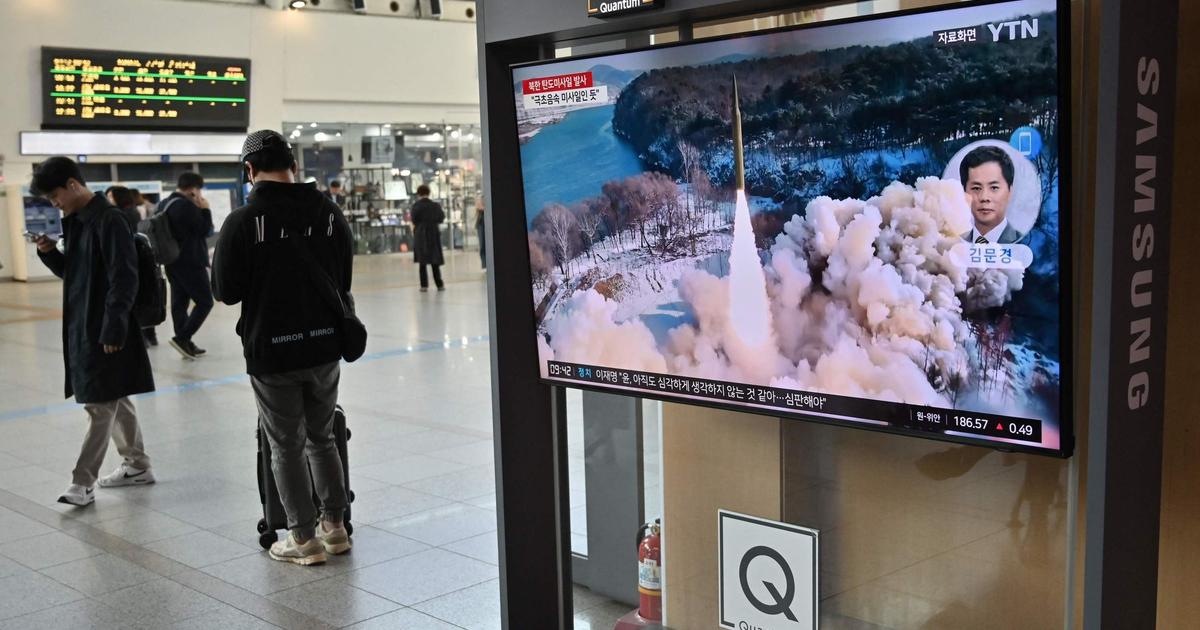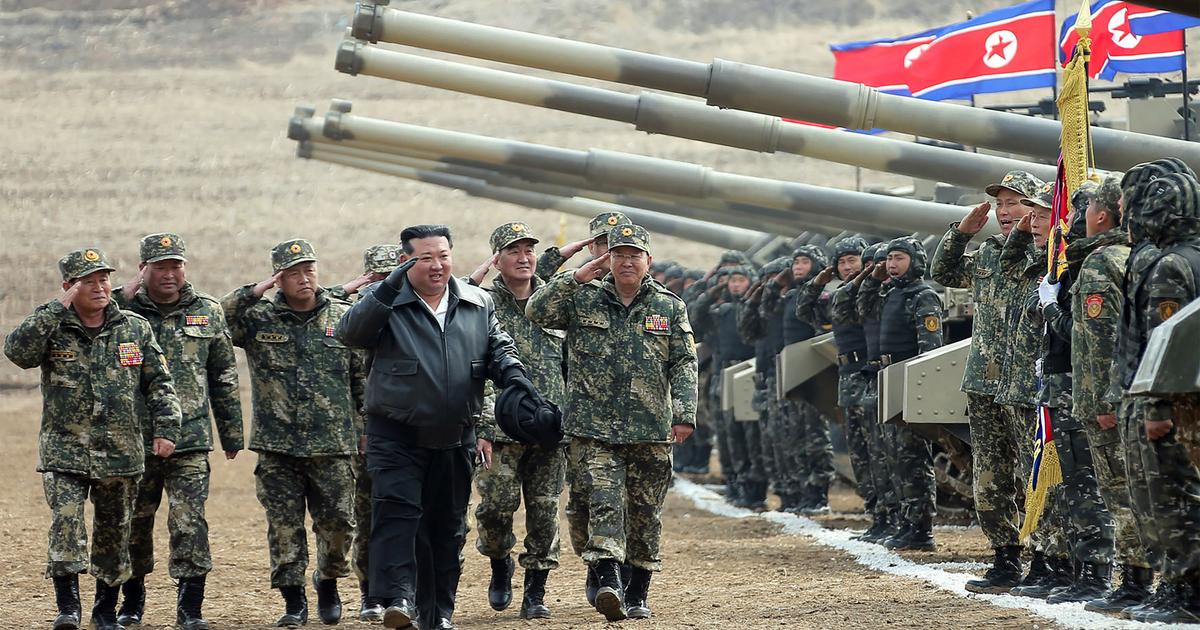WASHINGTON - In the four years since President
Donald Trump
's leader-to-leader diplomacy with
North Korea's
Kim Jong Un
collapsed following a failed meeting in Hanoi, the North's arsenal of nuclear weapons has expanded so rapidly that officials Americans and South Koreans admit that they have stopped trying to keep an accurate count.
North Korea's missile tests are so frequent that they elicit more shrugs than headlines in Seoul.
President Joe Biden, First Lady Jill Biden, South Korean President Yoon Suk Yeol and his wife Kim Keon Hee visit the Korean War Veterans Memorial in Washington, April 25, 2023. (Doug Mills/ The New York Times)
So when President Joe Biden hosts South Korean President
Yoon Suk Yeol at the White House on Wednesday,
the second state visit of the Biden presidency, there will be
little pretense
that disarming North Korea remains a plausible goal.
Instead, according to US officials, Biden's clearest commitment to Yoon will focus on what arms control experts call "
enhanced deterrence
," renewing a promise that the US nuclear arsenal will be used, if necessary, to deter or respond to a North Korean nuclear attack on the South.
The emphasis on deterrence is a
startling admission
that all other efforts over the past three decades to curb Pyongyang's nuclear program, including diplomatic persuasion, crushing sanctions and episodic promises of development aid, have failed.
It also aims to curb
South Korea's
growing demand for its own independent arsenal, given the remote possibility that North Korea makes the suicidal decision to use a nuclear weapon.
discussion topics
The North Korean arsenal will not be the only topic of discussion during Yoon's visit.
He and Biden will also celebrate the 70th anniversary of the alliance between their countries, pledges for increased South Korean investment in semiconductor manufacturing and plans to bolster Seoul's always tense relationship with Japan.
President Donald Trump and Kim Jong Un, the North Korean leader, meet with each other at the Demilitarized Zone in Panmunjom, South Korea, on June 30, 2019. (Erin Schaff/The New York Times)
But the rapid expansion of North Korea's capabilities is a matter of perpetual mutual concern for both countries.
At a recent security conference held by the
Harvard Korea Project
, several experts said they believed Kim's goal was to approach the size of the British and French arsenals, which
each hold between 200 and 300 weapons.
Biden and Yoon are expected to retain the possibility of seeking a diplomatic solution toward what a succession of administrations have called the "complete, verifiable, and irreversible denuclearization of the Korean Peninsula."
But the North, according to administration officials, has refused to respond to a series of public and private messages from Biden and his aides.
And what now seems irreversible is
North Korea's
entrenched and advanced program.
South Korean President Yoon Suk Yeol in his office in Seoul, South Korea, on Sept. 14, 2022. (Woohae Cho/The New York Times)
With China expanding its arsenal to 1,500 weapons by around 2035, according to Pentagon estimates, and Russia threatening to use tactical weapons in Ukraine, "this is not an external environment where it is easy to have a conversation with North Korea," he said. Victor Cha, a Georgetown University professor who led policy toward the North during the George W. Bush administration.
"They look around and say, 'I don't think so.'"
Trump promised "fire and fury like the world has never seen" as North Korea greeted his presidency with missile launches;
he finally tried the innovative approach of direct diplomacy with Kim.
He came out at one point predicting that Kim would start disarming in six months and declaring at another that the North was "no longer a nuclear threat."
The arsenal continued to grow.
Future
On Friday, North Korea's Foreign Minister Choe Son Hui, echoing a phrase her government has uttered frequently in recent months, said the North's status "as a world-class nuclear power is final and irreversible." .
First lady Jill Biden, President Joe Biden and South Korean President Yoon Suk Yeol pause as they lay a wreath as they visit the Korean War Veterans Memorial in Washington, April 25, 2023. (Doug Mills/The New York Times)
Few experts believe that the change in rhetoric or threats about first strikes indicate a greater willingness in the North to use nuclear weapons.
The response would be devastating.
But long gone are the days when US officials thought of the arsenal as a bargaining chip, something to be traded for trade deals or the hotel chain that Trump said the US would help build on North Korean beaches.
According to Joseph Nye, who oversaw one of the first intelligence estimates on North Korea for the US government, there was a mistaken belief that they would "try to trade their tokens and get something" for nuclear weapons.
But rather than developing the country, he told the Harvard conference, the North's main goal was "to preserve the dynasty," and that meant maintaining the arsenal and expanding it.
North Korea's new confidence in expanding the arsenal, US officials said in interviews, is partly explained by a change in the relationship with China.
Previously, the United States collaborated with Beijing - a critical energy and trade supplier to the North - to rein in the country.
In the mid-2000s, the Chinese even welcomed the so-called six-party talks - North Korea, along with Japan, Russia, the United States and South Korea - to resolve the nuclear issue.
When Pyongyang conducted nuclear tests, Beijing often voted for sanctions, and imposed some.
Now, instead of viewing North Korea as a rowdy, angry neighbor, China has welcomed it, along with Russia and Iran, as part of what White House officials call a coalition of the aggrieved.
While Chinese officials presumably fear that North Korea's nuclear tests could fail and create a radioactive cloud, they seem perfectly content that the North is troubling the United States and its allies with periodic missile tests.
The latest tests of North Korea's ICBMs - including one powered by solid fuel, which makes it quick to come out of hiding and launch - suggest that North Korea can now almost certainly reach US territory, although its ability to achieve specific goals is imprecise.
And in the last year, the North has enshrined its nuclear capability in its laws and started talking about its first-strike capability, rather than regarding its arsenal as purely defensive.
On March 27, North Korea also released photos of Kim inspecting the Hwasan-31, a small standardized kit of nuclear warheads that can be mounted on its various nuclear-capable missiles and drones.
If the module were real, the photos would mean the North is showing off its ability to mass-produce standardized nuclear warheads, according to Hong Min, a North Korean weapons expert at the Korean Institute for National Unification in Seoul.
Kim has also called for the mass production of nuclear warheads to "exponentially" increase the country's nuclear arsenal.
Last month, he ordered his government to
step up
production of weapons-grade nuclear materials.
South Korean officials said some of the North's claims, including the alleged capabilities of its underwater drones and supersonic missiles, were exaggerated.
The reaction from Washington and Seoul has been to commit to strengthening their alliance, which has been made easier by the fact that Yoon takes a much tougher view of how to deal with the North than his predecessor, Moon Jae In, who visited Biden. in May 2021.
So the two leaders are expected to talk at length, publicly, about "enhanced deterrence," with Biden offering more regular and visible visits by nuclear-armed submarines and aircraft to South Korea, bolstering recently reinstated joint military exercises and enlarged.
(Exercises were suspended and reduced several times under Trump.)
Kim Tae Hyo, a deputy national security adviser to Yoon, said a top agenda item at the summit was how to boost South Korea's confidence in Washington's commitment to protect its ally under its nuclear umbrella.
But Korean officials say that depends more on their trust in the incumbent US president - and whether, in the midst of a North Korean attack on the South using tactical nukes, Washington would be willing to risk nuclear combat.
Biden's words at a news conference on Wednesday will be scrutinized for what they may or may not say about his determination to take the risks of a nuclear commitment.
A new cyber initiative will also be announced:
The North finances its nuclear program with cryptocurrency thefts and attacks on central bank reserves, and the South, though it rarely talks about it, has developed an offensive cyber-savvy
corps
loosely based on US Cyber Command.
Outside observers will also be looking for signs of temporary or permanent damage from leaks of Pentagon and CIA documents in recent weeks that made it clear that the United States was listening to top South Korean national security officials as they debated whether to send artillery shells. to Ukraine.
The revelation was very embarrassing for Yoon, because it suggested
a lack of trust
on the part of his biggest ally.
But officials say they believe Yoon will top it, celebrating cultural ties to the United States and booming investment by South Korean companies in semiconductor plants.
There's one thing South Korean officials say they won't ask for:
the return of US tactical nuclear weapons to your country.
They were withdrawn in 1991.
Yoon's helpers say they don't want them back.
c.2023 The New York Times Company
look also
North Korea fired a new type of intercontinental missile that is harder to detect
Will the metaverse be entertaining?
South Korea has the answer











/cloudfront-eu-central-1.images.arcpublishing.com/prisa/KMEYMJKESBAZBE4MRBAM4TGHIQ.jpg)


